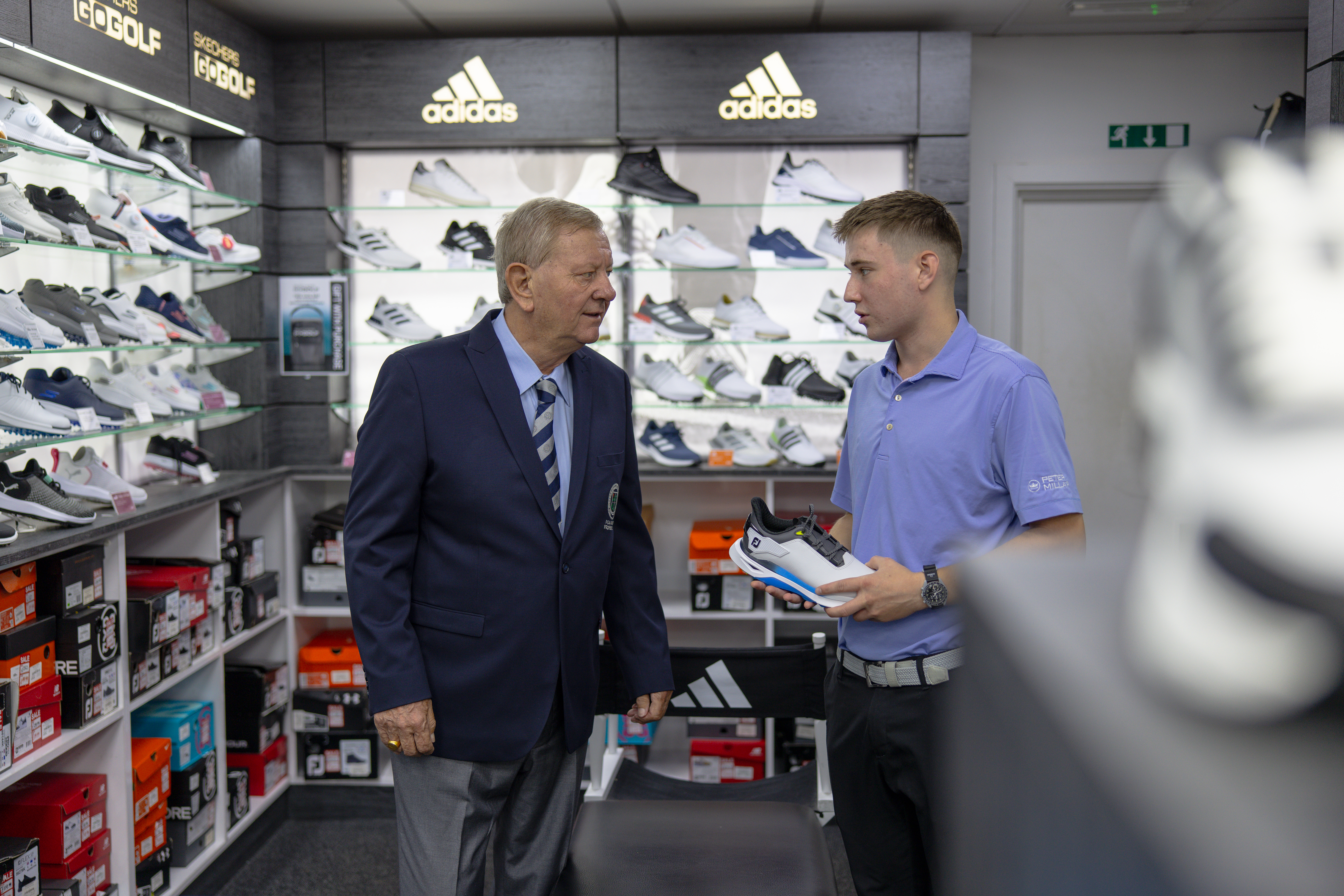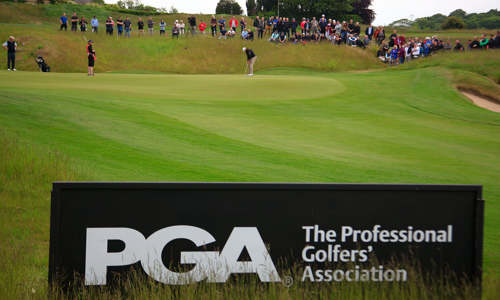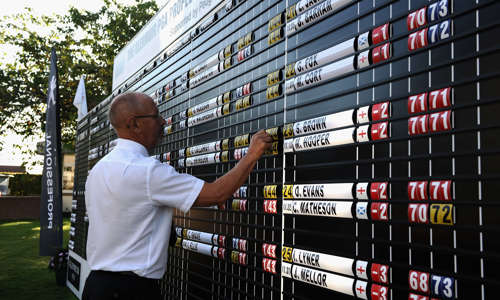I’ve always been customer orientated. They pay your wages and you have to look after them. If you don’t someone else will
- Doug McClelland - PGA Master Professional
Doug McClelland, PGA Master Professional and founder of Europe’s biggest club retail store at Silvermere in Surrey, shares his wisdom on everything from staff training to stock control.
When it comes to hiring PGA Professionals Doug McClelland is something of an expert. As the former owner of Europe’s busiest golf retail store, McClelland employed 25 PGA Professional staff. He knows the value of picking the right person for the job and ensuring repeat business through world-class customer service and continuous training. After 40 years in the business, McClelland retired from Silvermere in 2020 and now runs a successful consultancy business, helping golf brands grow and flourish. We asked him about the secrets to golf retail success.
How did the role of the club professional change over the decades that you were in the business?
Undoubtedly, it changed dramatically. Eighteen years ago, when The PGA were doing a piece of research, I told them that the days of the ‘Jack of All Trades’ was gone. That pro doesn’t exist anymore. When I left the tour and started to work in a club environment, the members expected you to have a shop like Harrods to sell at Tesco prices, be able to play like Jack Nicklaus and teach like John Jacobs. I was probably one of the last guys who was a Jack of all trades. I was a decent player, a decent teacher and a decent retailer. It was very difficult to combine all three, and you just can’t do it now. When you look now, you have specialist club fitters, specialist teachers, you’ve even got coaches who are specialists in coaching short game, putting and golf swing.
The reason I left the tour in 1978 was because I missed the Ryder Cup team by £178 in 1977. I had kids, a mortgage, school fees and things like that, so I decided that there wasn’t enough money as a playing professional. I thought if I didn’t make a success out of being a club pro I could go back and play again
Did you only stop playing professional golf because there wasn’t enough money in the game?
Yes. When I won the Dutch Open in 1973, I won £3,500. I was runner-up in the New Zealand Open in 1976, and I just made a bit more than my air fare and my hotel. There was no money. It was very difficult. In the early days, the best players –Tommy Horton, Brian Wade, Peter Butler – they all had club jobs as well. There were only a couple of guys, like Neil Coles and Brian Barnes, that didn’t because you had to supplement your income. The prize money was terrible. It only started to change when we had Sunday finishes and television.
Describe how your career unfolded after you left the tour
I started working at Leyland, and I had four very happy years there. Neil Coles was instrumental in getting me that job, a friend of his was the captain there. Then I took the lease on at Tilgate Forest, and from there I got asked by the owners of Silvermere if I would move there and take over the shop and running of the golf side of the business.
Did you always have a good business head?
I think I had a penchant for it, yes, a talent for it because I always thought like a customer. I followed the mantra that a manufacturer has got to think like a supplier, the supplier has to think like a retailer and the retailer has to think like a consumer. When that happens, the whole circle comes together. Normally the circle breaks down when the suppler doesn’t think like a retailer or the retailer doesn’t think like their customer. I’ve always been customer orientated. They pay your wages, and you have to look after them. If you don’t someone else will.
Product launches have become more frequent in recent years. How challenging is this from a stock clearance perspective?
It is challenging, but at the end of the day that’s what the consumer wants, and it does stimulate the market. You just have to be careful on stock control. The big boom now is in custom fit, so you actually don’t have to carry much stock. The big problem used to be having to sell your stock off at the end of the season when that product cycle was coming to an end. You had to take a huge hit on margins and sometimes not even get your money back. Custom fitting has removed that problem to a huge degree because you don’t have to carry the stock, and you get paid before you sell it. You’ve got a big advantage as a retailer now. I think I was the first person to build a custom-fit bay on our driving range – many, many years ago.
Was that because you wanted your customers to experience the tour level of club service?
Absolutely. All the things that people just accept as the norm now – when I was doing it, I was a trailblazer. When I signed my year’s stock intake with the suppliers, I used to say, ‘I want Bernhard Langer down to the centre in July, I want Ian Woosnam in June’. Even Seve came down. We had all the top players at Silvermere. It was part of my negotiations with the manufacturers. I wanted the customers to have an experience, for the tour truck to come along and have their clubs built. I wanted them to see that bit of theatre. All these things are normal now, but I was one of the first people to do it and introduce it into my yearly trading agreement with the suppliers. I had Nick Faldo come in. I had David Leadbetter for two days when he was teaching Faldo, and we ran a competition. We had 64 people who were winners in the competition come and have a lesson from Leadbetter. I was keeping Silvermere at the forefront of the industry with all these ideas. Of course, people copy you when you start doing innovative things like this, but I was the original trailblazer.
What challenges do traditional club professionals face now?
If you look at the typical club pro, most of them are under financed. You take the job, and you are allowed to teach, you’re allowed to play in pro-ams, you’ve got income from trolley or buggy hire - all of that requires no investment. But the things that set the retailers apart do need investment: staff training, systems, shop fitting, point of sale, those are the things you have to invest in. What happens is that most golf pros are frightened or reluctant to put money into retail because they’re not instantly going to get a return on it. They can play in pro-ams and make a profit or teach and get commission on green fees, but none of those things require investment. If you really want to be a success and set yourself apart as a retailer, then you have to invest. You need technology, staff training, custom-fit bays, and with all of these things you don’t instantly get your money back. So you have to have confidence that what you are doing with that big capital outlay is going to pay back.
With online sales, competition is tough. How do club professionals thrive?
Basically, you have to make yourself likeable. People buy things from people they like. If you really go out of your way to help, they will support you. When I was at Leyland, I used to caddy in some of the team events, I used to go away with the members. I really supported the club. You’ve got to become part of the club, and then the members feel semi-guilty about shopping elsewhere. Obviously you have to be competitive with your pricing also, otherwise you wouldn’t sell anything. That’s the problem now with the big online boys. It’s a bit of a free-for-all.
I went massively into clothing because it was the only way you could really make a margin because clubs were so competitively priced that you were working on middle-to-high-teens profit, having to sell volume to get good returns. Now it’s gone the other way. If you go online now, all the clothing is heavily discounted.
If you present your shop properly and display the product properly, you can create impulse buys. This is what I always tried to do at Silvermere. We had a very good clothing department with the best brands, and I tried to create impulse buys. Once the customer is in your store with a credit card in their pocket they will buy. So you try to create two or three sales out of each customer.
Once the customer is in your store with a credit card in their pocket they will buy. So you try to create two or three sales out of each customer.
-
You employed 25 PGA Professionals at Silvermere. What benefits did hiring PGA Pros add to your business?
It gives you credibility and it adds value to retail outlets, without any doubt. The PGA are widely accepted as a brand that knows what they are doing. It’s one of the most powerful brands in the world in sport. It’s accepted globally. It goes with high standards, integrity and honour.
There’s no question that having PGA qualified after your name is the biggest thing you can do towards furthering your career and getting a better job. It’s like getting qualified as a doctor - noone is going to take you seriously until you get those letters after your name. It’s the same in many professions.
As a recruiter of PGA Professionals, what did you look for in your staff?
They had to be qualified or nearly qualified. If your business is based around service, which mine was, you have to employ people capable of giving that service. It’s all about the customer. Fortunately, an awful lot of golf pros wanted to come and work for me at Silvermere, so we used to get a lot of top applicants. Pros realised that they had a chance to make some very good money and work in good surroundings. They knew that it would help further their career. People that worked for me went on to great things, which is very satisfying. Darren May was the best teaching professional I ever had. He went on to work for Jack Nicklaus at The Bear Club. He did all their custom fitting and headed up their teaching. He coached Keegan Bradley (who’s just been named USA Ryder Cup captain). He made an incredible reputation for himself in America. I think he works for Michael Jordan now, who designed a driving range, which is very successful. A lot of the guys that worked for me went on to be very successful. Nick Bradley is another one.





































